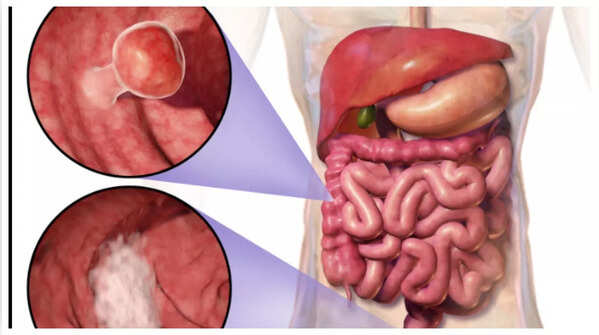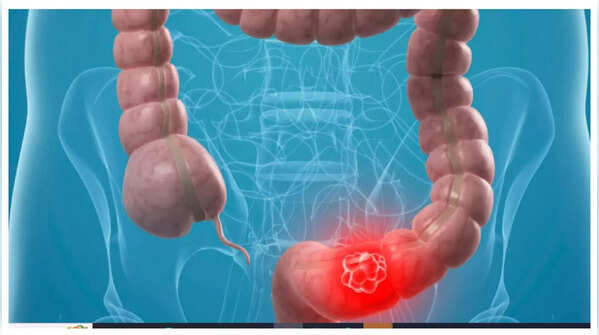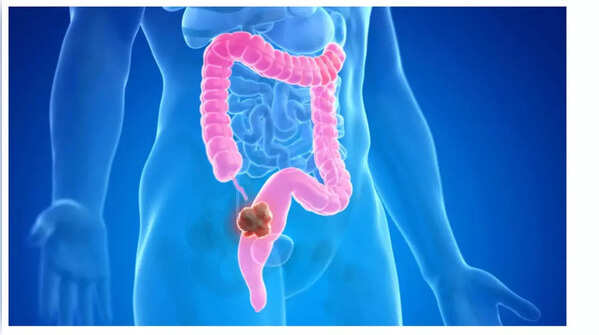Colon cancer, also known as colorectal cancer, originates in the colon or rectum. It frequently begins as benign clumps of cells called polyps, which can develop into cancerous tumors over time. While most cases occur randomly, factors like family history, obesity, and lifestyle choices can elevate the risk. The disease is most prevalent after the age of 50, and its early symptoms are often subtle, mimicking common digestive issues or stomach infections. It's important to be aware of potential warning signs.

A significant indicator of colon cancer is a change in bowel habits, which may include:
These changes may seem insignificant and are often attributed to diet, stress, or minor infections. However, persistent bowel changes lasting more than a few days, or recurring frequently, could signal a growing tumor disrupting normal bowel movements.

The presence of blood in the stool warrants immediate attention and investigation. It may manifest as:
In some instances, the bleeding may be minimal and undetectable to the naked eye, leading to anemia over time. While blood in stool can stem from various conditions like hemorrhoids or infections, excluding colon cancer is crucial, especially when it occurs repeatedly or alongside other symptoms.
Persistent abdominal discomfort is another early symptom frequently overlooked. This can encompass:
Such discomfort may be mistaken for indigestion or other minor digestive problems like constipation. However, if the pain is continuous and unrelated to dietary or lifestyle modifications, it could suggest a tumor causing irritation or blockage in the colon.

Unexplained and excessive fatigue or weakness can be a subtle indicator of colon cancer, particularly when accompanied by other symptoms. This often arises from slow, unnoticed bleeding in the colon, leading to iron deficiency anemia. With a reduced number of red blood cells, the body struggles to transport sufficient oxygen, resulting in fatigue, shortness of breath, and weakness. Although these symptoms can be attributed to stress or lack of sleep, medical evaluation is advisable.

Losing weight without any conscious effort is a common symptom in most cancers, including colon cancer. The body's immune system works overtime to combat cancer, and tumors can disrupt digestion and appetite. Significant weight loss without changes in diet or exercise should prompt a visit to the doctor. While this symptom often appears later in the disease, it can sometimes serve as an early warning sign.

Disclaimer: This information is intended for educational purposes only and should not substitute professional medical advice. Always consult with a qualified healthcare provider for any health concerns.
It's important to consider a healthy diet.

Do not ignore any symptoms.

A cancer diagnosis profoundly impacts a person mentally, often triggering intense emotions.

Consult a doctor if you experience any of these symptoms, and don't wait for them to worsen.

Exercise helps prevent many ailments, including cancer.

Do not ignore these symptoms.

If you observe these signs, talk to a doctor.

Do not ignore these signs.

Stay healthy.

Identify the symptoms before its too late.
Newer articles
Older articles
 Emma Raducanu Shuts Down Carlos Alcaraz Dating Rumors, Confirms US Open Mixed Doubles Partnership
Emma Raducanu Shuts Down Carlos Alcaraz Dating Rumors, Confirms US Open Mixed Doubles Partnership
 Woakes Regrets Umpiring Decisions as India Seize Control on Day 1 at Edgbaston
Woakes Regrets Umpiring Decisions as India Seize Control on Day 1 at Edgbaston
 Black Caps Primed for Blockbuster Home Summer Against Cricket Giants
Black Caps Primed for Blockbuster Home Summer Against Cricket Giants
 Gambhir Defends India's Tailenders After Test Collapse, Cites Missed Catches as Key Factor
Gambhir Defends India's Tailenders After Test Collapse, Cites Missed Catches as Key Factor
 SA20 Teams Given Green Light for Six Player Retentions Ahead of Auction
SA20 Teams Given Green Light for Six Player Retentions Ahead of Auction
 Rishabh Pant: Revolutionizing Cricket with Unconventional Batting, Says Greg Chappell
OR
Greg Chappell Hails Rishabh Pant as Cricket's "Reinventor"
Rishabh Pant: Revolutionizing Cricket with Unconventional Batting, Says Greg Chappell
OR
Greg Chappell Hails Rishabh Pant as Cricket's "Reinventor"
 Mirabai Chanu: Olympic Medalist's Relentless Training Regimen Extends Even to Family Time
Mirabai Chanu: Olympic Medalist's Relentless Training Regimen Extends Even to Family Time
 Rishabh Pant's "Game-Changing" Centuries vs. England Earn Praise From Greg Chappell
Rishabh Pant's "Game-Changing" Centuries vs. England Earn Praise From Greg Chappell
 Small Steps, Big Heart: Science Reveals Simple Habits for Optimal Cardiovascular Health
Small Steps, Big Heart: Science Reveals Simple Habits for Optimal Cardiovascular Health
 Kavya Maran, SRH CEO, Addresses Viral Meme Status and Passion for Cricket Team
Kavya Maran, SRH CEO, Addresses Viral Meme Status and Passion for Cricket Team